I’ve been friends with Ed McDaniel (aka Captain Ed) for over ten years. We met working in Facilities Services at the University of Tennessee, Knoxville. We are union members of United Campus Workers (UCW), which we both were privileged to serve as Local President. We’ve spent a fair amount of time in cars, buses, conferences, and events together and music is a favorite topic. I’ve known Ed was a lover and collector of Jazz and eclectic records for a long time. A few years ago he started deejaying at a small bar in Maryville where he became “Captain Ed” and started the “Vinyl Voyage.” Later, he turned online and started broadcasting on Twitch. I recently had a chance to sit down and talk with him about it.
*****
TOM: Tell me about yourself. You were born in Cincinnati?
ED: Yep, my family was originally from Tennessee and they moved up after World War II. My parents had me late [father was a WWII vet] and they moved to Cincinnati because my mom really wanted to move to the city. So I lived in Cincinnati until I was about 14, then my parents decided to move back to TN. My dad was from Claiborne County and my mom was from Martel, which is Lenoir City. So I, you know, from 14 on lived right at the Smoky Mountains near Cades Cove [Townsend, TN].
TOM: Did your parents listen to a lot of music?
ED: Dad listened to golf and baseball games.
TOM: [laughing] I can respect that.
ED: And, at some time, he was really into roots country or Americana without it being [called that at] that time. Old country and bluegrass. And my mom would listen to a wide genre of, like, sappy rock. That had a definite impression on me, like, you know, Judy Collins’s “Send in the Clowns” and Bette Midler’s “The Rose.” Um, it was never really forced on me, but at the time there was a craze about rock and roll being evil. And my parents would listen to all kinds of gospel sermons on tape. There was this guy called Gary Greenwald who preached the evils of rock and roll. That was an important influence on me in the right way. I learned about who Todd Rundgren was and other stuff.
TOM: So what did you listen to growing up?
ED: A wide range of rock and roll, like the 80s – that’s 80s new wave and also some soft rock, a little bit of hard rock, but progressive rock. Stations in Cincinnati aren’t like the classic rock stations down here. They had a wider range. I learned about Marillion, a progressive English band. I was definitely listening to Bill Withers, and all kinds of like, um, some soul artists like Aretha Franklin and James Brown.
Also, my parents, in their collection, they had Xavier Cugat and Miriam Makebee [Makeba]. Xavier Cugat was, you know, Latin-type music, like boogaloo, and some Samba; and Miriam Makeba was like traditional African folk music.
TOM: That’s pretty cool, I mean that’s outside the norm, I think.
ED: Yes, my not really understanding genres till later was a positive influence, which, to this day, is still important to what happens on the Vinyl Voyage.
TOM: So, how did your musical tastes develop?
ED: In high school, I listened to Iron Maiden and early Metallica. I was playing Dungeons and Dragons, and listening to Black Sabbath and stuff, so the game crowd definitely had a good influence on me. But, at the same time, I listened to things they couldn’t stand, like hip-hop. I was listening to early hip-hop, which is, you know, things like Salt-N-Pepa and Afrika Bambaataa, and things like that.
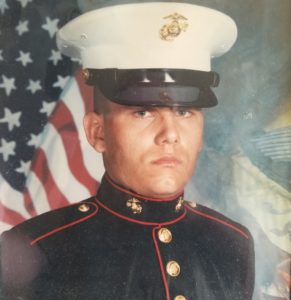
And in the Marines, I started learning to appreciate classic country. One of the most important things in my life was my six years in the Marine Infantry because it’s all just poor people from across this country and in the world. There are a bunch of poor rednecks, a bunch of poor Black city kids, a bunch of poor, you know, Mexican and Latin American immigrants, and definitely some Filipinos. And, for the first time I met Native Americans. You’re all in this infantry unit together, you know, and listening to everything.
My first deployment was Okinawa, Japan. And, of course, I spent two months in the Philippines trying to suppress a coup attempt. That was the first time I ever saw like, any kind of real action or anything. This is pre-Desert Storm. We are at the most northern base in Okinawa and it’s just Marine Infantry. You’re far from the Air Force, Army base, you know, where you want to go hang out and party in the bigger cities. So you’re sitting there in this enlisted, like, club buying beers out of a machine when you’re eighteen, nineteen, twenty years old, for like a dollar or seventy-five cents. And you’re all sitting there together eating cheap, flat pizza, and paying a dollar to watch three videos. Everyone’s taking turns and stuff, watching this together, and you get a huge conglomeration of music: MC Hammer, or Aerosmith Pump, Guns-n-Roses, and Salt-N-Pepa, etc.
When I first got back to the states from that six-month deployment – this is before the internet – and I was still calling home occasionally and getting letters. You feel like you just come back from the moon after two years, but you’re really gone for six months, just on the other side of the planet. We went from an open squad base in bunkracks together (and it really sucks) to an infantry unit it in three-man rooms, crappier than any of our bad dorms at the University of Tennessee (UTK). But everyone bought all these TVs and radios in Okinawa and shipped them back cheaper than you can buy them here; and everyone gets MTV when they still had videos, and we all saw Nirvana’s “Smells Like Teen Spirit,” and it was like we had no vocabulary for that. We’d all listened to and watched like hard rock and stuff together, and all of us just could not process it. I remember a buddy of mine I was in a foxhole with, Revels, going through Desert Storm. He was a Black Marine from the Bronx. I remember him running out saying “I don’t even know what’s happened to this country!” I mean it was still a form of rock and roll, but I just remember it blowing our minds. We didn’t know what Grunge was. Then I became a major fan of Grunge music.
TOM: So, what are your current musical interests?
ED: Progressive music, like English American progressive music and prog. Classic 60s, 70s prog from around the world. I love Turkish Prog. I like psychedelica that’s classic to us, like Captain Beefheart and Pink Floyd; but I love world psychedelic music, like from Turkey, like Atlin Gun. I really like psychedelic Cumbia, Bossa Nova, and salsa, samba.
TOM: It’s amazing that’s a thing.
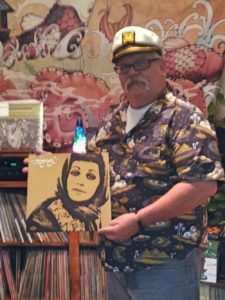
ED: It is, yeah. I love Arabic music. There’s this form called the bebe funk. I call it an Arabic disco. You know there’s a lot of Arabic disco from the 50s, 60s and on. I like Iranian music, back when it was, you know, a little bit more free and stuff, before the Islamic Movement took over. I love world disco. I love afro beat, so I collect a lot of that, and more of the cornier things like electro swing, which is electronic swing music.
What’s interesting is, the union (UCW) has opened up my heart and mind to understand where people are coming from. Instead of, you know, stereotyping and puttin’ my own definition on people. World music is a big thing. We don’t know what to call it so we still call everything outside America or Britain world music. That’s not quite an insult, but it’s kinda like saying you’re not part of us. I’m crazy about Japanese fusion jazz. There’s all kinds. I’m getting more interested in Pacific, mainly Japanese, pop, you know, arena rock, and stuff like that.
TOM: So, Captain Ed and deejaying, right? How did you go from just loving all this music to spinning records for other people?
ED: I never expected to be a deejay. Trent, a friend of mine, owned this cool place in Maryville [TN] called Public House on High, where all the cool, eclectic, weird people showed up. He told me to show up on a Friday night with my records.
The bar closed down before Covid, about a year ago. So I brought some records – some blues, a little bit of jazz, some rock, and Linda Ronstadt – and I started playing that night with one record player. There was a small crowd there that really seemed to dig it and they’ve followed me ever since. From there, I bought two deejay decks and a mixer. Somebody gave me a mixer at first. It finally fried and I bought another one, then a third professional one. I would go back between Public House on High and this place called The Bird & the Book [also in Maryville]. Those are the two places that always agreed with me and was open minded, and both places were like islands of broken toys of people.
TOM: Is there like a community?
ED: There is a community. And there are certain ones I’ve tied to locally. Um, DJ Casanova. Cassie Waters got me to play a fundraiser for Jobs for Justice and DJ Casanova and I played that.
TOM: I remember that night. That was fun.
ED: Yeah, you know, cuz we were playin’ a lot of disco-soul-funk. Then about a year later, we decided to do another fundraiser and that’s when I met Claude Hardy, a union member who teaches at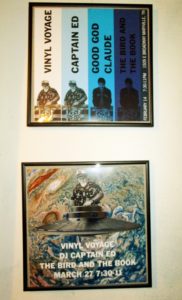 Pellissippi [State Community College]. He goes by Good God Claude. So DJ Casanova, Good God Claude, and myself all deejayed that night. Cassie’s like ‘We’re gonna do three song blocks,’ and me & Claude were like, ‘Yeah that’s what we’re gonna do from now on.’ And it’s to this day how Claude & I deejay together.
Pellissippi [State Community College]. He goes by Good God Claude. So DJ Casanova, Good God Claude, and myself all deejayed that night. Cassie’s like ‘We’re gonna do three song blocks,’ and me & Claude were like, ‘Yeah that’s what we’re gonna do from now on.’ And it’s to this day how Claude & I deejay together.
TOM: So, whether it’s spinning records, deejaying, or music, do you have any particular inspiration or a person or group who really kinda fired you up about music or records?
ED: Nothin’ really at first, but later I really started gettin’ into the vinyl community, following certain people on Instagram. There’s this guy named Victor Kiswell who plays a lot of Arabic music. There’s Egon and Questlove. There are these internet radio stations like NTS, and they play wide genres. Then I started, like, the whole “Captain Ed.” I showed up at my friend’s bar, where I started, and I’m like ‘I’m goin’ by Captain Ed and this is gonna be the Vinyl Voyage,’ because I was in the Marines, you know, and Marines are soldiers of the sea. You never call us soldiers, but soldiers of the sea. It’s part of our naval history.
This whole thing about me digging for treasure and finding these treasures of vinyl goodies, and coming back and bringing them to the crew – the Vinyl Vikings. It all kinda developed. I’d make these, like, waves where I’d start off with rock and raise into a crescendo of rock, then bring us down with some sappy music and stuff – some, you know, Frank Sinatra and Bert Bacharach. Then I’d bring us up with a bunch of funk, like Parliament and stuff, then take us back down to some blissful soul like Marvin Gaye & others like that. So that kinda developed naturally, then I saw and heard others do it and it kinda helped propel me along. It influenced me on how to perfect that whole vinyl voyage, you know, of goin’ out into international waters. I’d announce it beforehand: ‘We’re headin’ out into international waters,’ and, ‘The Captain’s ready to marry whoever.’ And, like, people would come up to the stage and ask to get married & stuff and I’d have these ceremonies, you know. We’d come into these ports of make-believe Arabic kingdoms & stuff from the past, or wherever, you know.
TOM: That’s cool. So “Captain Ed” was kind of a combination of things. The whole concept just kind of came as you started saying ‘This is somethin’ I really enjoy doing and I wanna do it on a regular basis.’
ED: Right, right. It kind of energized me especially with the support of Trent from Public House on High, you know. I’m like ‘I’m buyin’ a Captain’s hat today and I’m gonna wear that at the Voyage,’ you know, ‘with a Hawaiian shirt.’ And he was like, ‘Yeah, yeah. And if you can’t find one, let me know, I’ll take off right now and find you one.’
TOM: [Chuckles] And that was it – from then on, you were Captain Ed.
ED: Yep.
TOM: Awesome. So, how do you prep for a show equipment-wise? How do you decide what you’re gonna play, pick tracks, order, and that kind of thing? It seems like there’s a lot of work that goes into that.
ED: There is. There’s also a fair amount of it bein’ organic and happening on the fly. So, um, I bring two crates of records, like carried boxes. I probably bring about 150 to 200 records with me. Three quarters or two thirds get played and the others are just extra. So, I kinda have a feeling how I wanna start a voyage, how it progresses. Sometimes they’re genre-less, like all over the place, but, generally, I kinda ride waves and there are certain genres that get stacked and follow after each other. I’ll hear songs – songs that hit all of us emotionally for the most part. I want to relay that emotion to people, no joke, you know.
TOM: So, that’s pretty wild about how you put together a show. It’s really a live thing. You’ve gotta have a pretty incredible knowledge of songs and artists and styles and all of that, to know ‘I think this track by this artist on this record should come next.’ I mean that’s kind of amazing to me.
ED: That is more of my strong suit than knowin’ the trivia of the bands. And I feel bad because I grew up with a lot of cool people who knew music trivia. I know some. But, really, I know songs and how they make me feel and others feel. I definitely play things I like, but there’s records here that will never get played for people because they’re more experimental. I’m conscious of what I take with me or play on the Voyage. Like I might play somewhat outsider stuff, but we get to that point and we leave to go into somewhere that’s more known. Like, I’m not Dr. Demento, who I do like. I’m going to play something I believe the audience can relate to, you know? Like I’m not really there to educate you. I’m more there to entertain you, you know.
TOM: Right. So how did you learn to mix and work the technical side?
ED: I had to learn it on my own. And every time I looked things up, it was about how to scratch and stuff, or how to use the CD deejays, like ones who don’t use records and use a music service. That’s more like people playing parties and weddings and stuff. I just wanted to spin vinyl records, introduce people to music they didn’t know, might not know, or definitely knew. And take ‘em on a Voyage to escape that week.
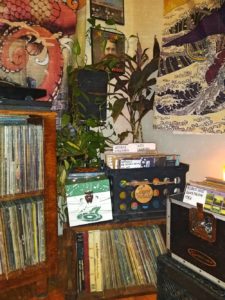
TOM: Is there a rhyme or reason or is it just kinda the feel of the week?
ED: A little bit of both. Because, when I’m here by myself, or havin’ conversations with my friend, Claude, we’re discovering music. We listen to something on YouTube or Discogs, or some other service, that offers suggestions. And I want to play something familiar, you know. That’s why I don’t play experimental jazz. We had one jazz night and the majority we played was like fusion and genres right on the outside of jazz. We only played like a half a dozen or so standards from Davis and Mingus and Coltrane.
TOM: Right, cuz that’s the stuff everybody knows and hears all the time. So, you started out doin’ live and now you do the Voyage online on Twitch. Talk about that shift. Is that somethin’ you thought about doin’ ahead of time, or was that Covid?
ED: Yeah, Covid. Because I really never wanted to do the Twitch thing. Some local artists, some international, and artists in this country get lots of traction. I get somewhere between five and forty people, you know. But there are certain people who have followed me from the beginning, and I wanted to have an outlet for them on Friday nights. I’ve made a schedule of doin’ it twice a month. I’d rather be doin’ it hit & miss without masks and all of us getting past the Covid, which will probably be a few months from now. That’s what I really want to eventually go to, you know. But I still try to make a conscious effort of getting attention, and get more people on Twitch.
TOM: Right. So, talk about the differences between live versus streamin’ online from home. I mean you clearly prefer the live setting.
ED: Yeah. When you’re live and there’s 30 to 50 people there, it really feels great, you know. You feel like you’re connecting with people and feel energized. I’m gettin’ the energy to people and they say: ‘You’re playing a great song.’ There’s this one lady that keeps sayin’ ‘You’re playin’ my heart tonight, Ed.’ And I’m like ‘Good, good,’ and I feed off that, but, it’s kinda lonely and weird here at the house & stuff. I’ve kinda got used to it. I would have stage fright before, playing before a crowd. Now it feels like it’s not quite stage fright, like, you know, are people tuning in because they enjoy it or are people tuning in because it looks like I’m sad here –
TOM: [Laughs]
ED: [Chuckles] And they feel sorry and ‘Let’s tune in.’ But I’ve gotten feedback. People like it, you know. It sure is easier, um, you know to hook everything up and play here & stuff.
Sometimes Twitch is kind of a problem. Like, I wonder if people are hearin’ me or not. I feel like I’m constantly askin’ people, like: ‘How’s the music volume,’ ‘How’s the mic volume,’ whereas out in public you can tell, you know.
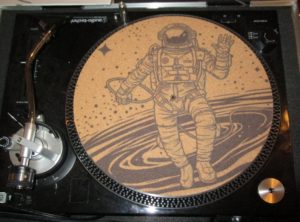
TOM: So has it changed what you spin? Because like at home you’ve got your entire record collection, whereas, if you’re goin’ out, you have to think about what you’re takin’.
ED: It has some. Like, I’ve got a certain wave or genre, however you wanna say it. I always try to think of nautical terms, to make this whole thing a package together. People seem to be enjoying it, so, instead of a genre, I’m like, ‘I’m ridin’ a certain wave.’ It can turn in a moment’s notice. Like, we’re all somewhere together – me and the Vinyl Vikings. When I’m out in public, it’s kind of a sit voyage with a few different little charts (as I call records) that I could change up. But, you know, here, it’s like all of a sudden. Like last week, it became a huge post-punk/goth block for about an hour, which people absolutely seemed to have loved. I still put everything in my two carry cases and plan for the night. That was in my record shelves and not in my cases and so I was able to do that. But sometimes here at the house things get weirder than they do out in public. I’m more conscious because I don’t take requests. This is what I’ve brought, please enjoy the voyage. I’m not a wedding deejay and not everyone understands that. The actual fans really do understand, like ‘We’re here for whatever you play, Ed,’ and I really appreciate it. There are people who don’t know and come up for the “Pina Colada” song.
TOM: [chuckles]
ED: I’m playin’ Arthur Brown’s, you know, “Fire.” I’m sorry. I don’t have the “Pina Colada” song. I don’t take requests. That almost sounds shitty, but I don’t, you know.
TOM: You talk about waves, so it’s really less about genres or styles or particular types of music, and more about how the music makes you feel.
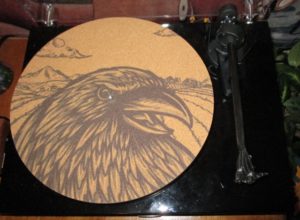
ED: Right. I can play a soul, a rock, and a stoner rock song that all kinda make you cry. The next thing you know, I could play some soft AM rock, and, you know, pseudo–alt country, and something else that makes you very happy. They all fit together, even though they’re all from different genres. Really, a lot of artists are putting these songs on an album. They’re known for certain genres, but they have music outside of them. I think that’s kinda incredible ‘cause people get thrown for loops in good ways. Like I don’t want to make an extreme change. Like, ‘Oh wow, you just took me out of a mood, not that this new mood is bad. I’m just not ready for it and I’m seasick now.’
TOM: Right. There’s a certain, I think, crossover element to almost every artist.
ED: Yeah. Like, the librarian part of me (which I’m not a librarian) the Capricorn, wants to organize stuff in genres. But the more enlightened person, per se, wants to be careful of pigeon-holing people and genres.
You can see all these tabs on my record collection, like, I’ve genred [sic] everything, you know, but certain jazz and others are in different genres. Like Coltrane is in both experimental and, you know, bop, a modal section. Davis is in both the modal and the fusion section.
TOM: So, where do you see this going? What’s the future?
ED: There’s certain local people I’ve met who are into this, and I kinda want to be part of that community. I would like to continue this for a few years, growing with each other consciously or unconsciously, bringing entertaining music, and increasing our, you know, boundaries. I don’t expect this to grow big. Whenever this dies, I’ll enjoy all the records I have. I want to continue listening to records till it’s time for me to pass. I want to pass them on to an educational service or to friends. Somehow, this path was thrown before me. I fed into it and I don’t know how long it’s gonna go, and I don’t care.
Yeah, I’m enjoying it. We all have heard music that’s absolutely shook our soul in various ways, and we want someone to hear it. A lot of times people will share [music they hear on] the Voyage and hopefully others are getting things out of it. I want to share this with people – that’s what I’m getting out of it.
TOM: Right. Well music is really an emotional and a spiritual kind of experience, you know, almost a religious experience.
ED: It is.
TOM: I’ve tuned in to a number of your Voyages now and I’ve subscribed. I’ll often play it even when I’m doing something else. Because you play stuff that I’ve never heard before. It takes you places and that’s really amazing.
ED: Thank you.
TOM: So how can people find you?
ED: They can find me on Instagram. It’s Captain _ _ _ Ed. The reason for three underscores is because there are three other Captain Eds. You can also find me on “Captain Ed’s Vinyl Voyage” on Facebook, and that will let you know when the Voyages are. There’s a CaptainEd Twitch, with no spaces. Those are three great ways of finding me.
TOM: Cool. Is there anything you want to add? Any final thoughts, or, you know, deep philosophical . . .
ED: No, no. I don’t have any deep philosophy. I’m just trying to make it like everyone else. Some days I feel like I’ve got the answers. Most days I don’t. You know, like music not only heals; it just keeps you plugging along. Of all the insane things we have created as a human race, that have been detrimental or positive to us – God bless music.
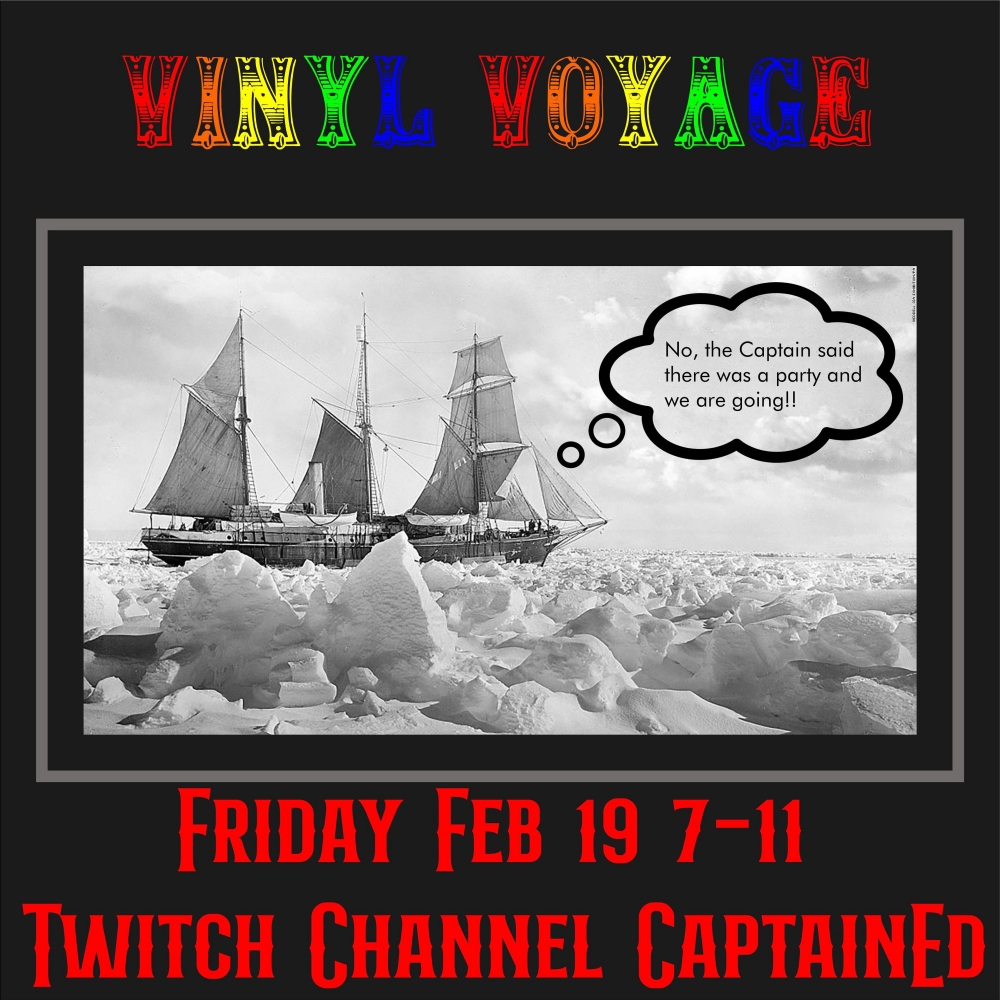
**Featured Image of Captain Ed at his turntable by Tom Anderson
***All photographs with the exception of Ed McDaniel’s Marine image taken by Tom Anderson
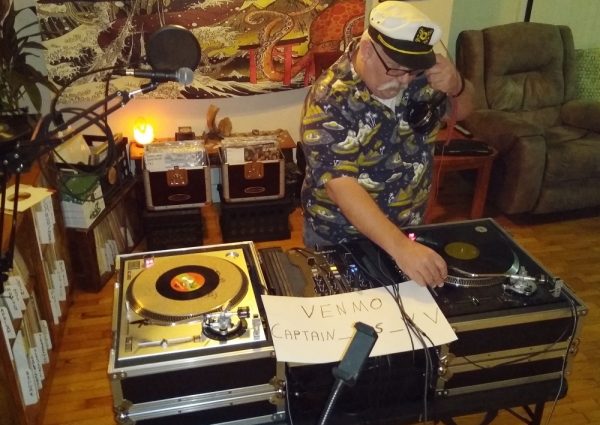
Captain Ed is cool! Thanks for the interview, and thanks to Captain Ed for lots of new music to check out.
I’m glad you think so too! He expands my horizons on a regular basis and I’m happy I could share the Voyage.
I really liked your interview, Tom. Captain Ed is a pretty interesting fellow. Checked out Captain Ed on Facebook and enjoyed listening to the music. Wish he had a spot on the radio! Facebook censored some of the audio portions due to copyright issues?? Does he have a playlist for his shows?
So glad you enjoyed it! Ed is a special guy and a great friend. Good God Claude (aka Claude Hardy), his friend and fellow deejay, has a number of their shows, along with many of his own, posted on his Mixcloud page, found at: https://www.mixcloud.com/clauderocks/. You don’t have to have an account to listen, but I’m sure he’d appreciate a like. I don’t think Ed has playlists since they develop kind of organically, but I’ll find out.
I did manage to figure out the name of the artist I was enjoying. Took a few stop and stares and a google search, but I got it. It was Jimmy McGiff, the album, Stump Juice. I really didn’t expect a playlist. It is hard to read the album covers, at least in the show I was watching.
Glad you figured it out! I’ll have to look him up. If you tune in to his shows on Twitch there’s a chat box where you can ask what he’s playing. Very handy.
Thanks, Tom!